



"Stuckness. That's what I want to talk about today. Back on our trip out of Miles City you'll remember I talked about how formal scientific method could be applied to the repair of a motorcycle through the study of chains of cause and effect and the application of experimental method to determine these chains. The purpose then was to show what was meant by classic rationality.
Now I want to show that that classic pattern of rationality can be tremendously improved, expanded and made far more effective through the formal recognition of Quality in its operation. Before doing this, however, I should go over some of the negative aspects of traditional maintenance to show just where the problems are.
The first is stuckness, a mental stuckness that accompanies the physical stuckness of whatever it is you are working on. The same thing Chris was suffering from. A screw sticks, for example, on a side cover assembly. You check the manual to see if there might be any special cause for this screw to come off so hard, but all it says is "Remove side cover plate" in that wonderful terse technical style that never tells you what you want to know. There's no earlier procedure left undone that might cause the cover screws to stick.
If you're experienced you'd probably apply a penetrating liquid and an impact driver at this point. But suppose you're inexperienced and attach a self-locking plier wrench to the shank of your screwdriver and really twist it hard, a procedure you've had success with in the past, but which this time succeeds only in tearing the slot of the screw.
Your mind was already thinking ahead to what you should do when the cover plate was off, and so it takes a little time to realize that this irritating minor annoyance of a torn screw slot isn't just irritating and minor. You're stuck. Stopped. Terminated. It's absolutely stopped you from fixing the motorcycle.
This isn't a rare scene in science or technology. This is the commonest scene of all. Just plain stuck. In traditional maintenance this is the worst of all moments, so bad that you have avoided even thinking about it before you come to it.
The book is no good to you now. Neither is scientific reason. You don't need any scientific experiments to find out what's wrong. It's obvious what is wrong. What you need is an hypothesis for how you're going to get that slotless screw out of there and scientific method doesn't provide any of these hypothesis. It operates only after they're around.
This is the zero moment of consciousness. Stuck. No answer. Honked. Kaput. It's a miserable experience emotionally. You're losing time. You're incompetent. You don't know what you are doing. You should be ashamed of yourself. You should take the machine to a real mechanic who knows how to figure these things out.
It's normal at this point for the fear-anger syndrome to take over and make you want to hammer on that side plate with a chisel, to pound it off with a sledge if necessary. You think about it, and the more you think about it the more you're inclined to take the whole machine to a high bridge and drop it off. It's just outrageous that a tiny little slot of a screw can defeat you so tally.
What you are up against is the great unknown, the void of all Western thought. You need some ideas, some hypotheses."
(Zen and the Art of Motorcycle Maintenance, Bantam, 1975)